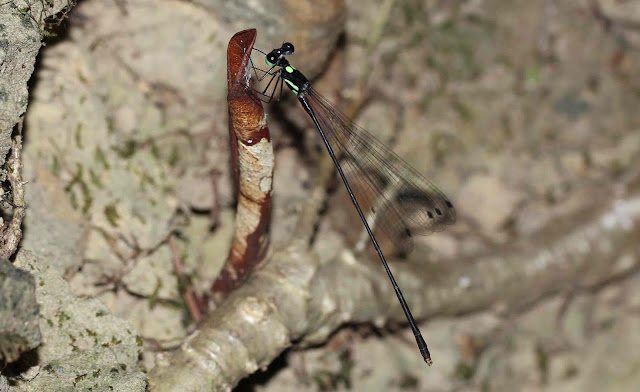*Adjusted on January 20, 2017. Paper was published on
C. mattii so I added its name here.
Just a few weeks ago Rory Dow published
Coeliccia suoitia from the Da Lat area. I revisited the location where I had observed them in December last year and this time (April 16) found the undescribed female and a single male. Finding the female proved that the female I had included in my December post was not the female of
C. suoitia at all. I deleted the photo from the post, in case you did not notice. The real female has similar colours and pattern to the male and has two lateral horns to the prothorax. This is very interesting and supports Rory's assumption that this species is not a regular
Coeliccia at all.
 |
| Female Coeliccia suoitia |
At the same location and same date I also caught a single male and observed another of a different species and it is likely that the female I photographed in December concerned this species. It is mostly yellow-and-black, and it has been suggested it is a form of
Coeliccia montana. I doubt that very much. It is larger and has a different thorax pattern. It shares pruinosity on the prothorax, but in addition also has a pruinose spot on the mesepimeron. And it has paler and differently shaped appendages, with less yellow on S9-10. I was informed by Wen-Chi Yeh that he has a similar specimen from the general Da Lat area, which shares all these peculiarities. For the moment this remains a
Coeliccia sp. novum, to be described when we can bring the various materials from this area together in a paper.
 |
| Coeliccia sp. novum, note pale appendages and lack of yellowish on S9 |
 |
| C. montana-like pruinose prothorax, but note pruinose spot on mesepimeron and yellow, not whitish coxae. |
At a different location at the bottom of a very wet small valley in undisturbed forest a smallish
Coeliccia caught my eye on April 18. It seemed to have a pale blue thorax, like
Coeliccia poungyi, but upon close inspection it turned out that it had a largely pruinose thorax, so it did not have real blue, but the underlying colour was black. Non-pruinose parts were yellow. It was considerably smaller than the aforementioned species and clearly undescribed. But it turns out that Wen-Chi Yeh also collected it around Da Lat and specimens from Rory and Matti Hamalainen are stored at Naturalis, Leiden. This species was described in 2016 by Toan and me as
C. mattii. The female is a lot like the female of the aforementioned species and also like that of
Coeliccia montana, but smaller.
 |
| The other Coeliccia mattii male with pruinose thorax and prothorax and yellowish appendages |
 |
| Two males and a female of Coeliccia mattii (top three) and Coeliccia sp. novum 1 (bottom), showing big difference in size. |
The last
Coeliccia I found new on my recent trip to Phu Quoc (on April 12) was
Coeliccia yamasakii, a specialty of Phu Quoc (as far as Vietnam is concerned). I found only a single male and 3 females at a single location. Although it should be more easy to find, it was in fact very hard to find and I guess that has to do with the extreme drought. But I was a happy chappy.
 |
| Coeliccia yamasakii male, recognizable by the small greenish yellow thorax spots and all dark abdomen with only the appendages paler. This is an adult, the subadults males have more extensive pale areas on the thorax and abdominal tip. |
 |
| The female of Coeliccia yamasakii, relatively blueish. |







No comments:
Post a Comment
Note: only a member of this blog may post a comment.